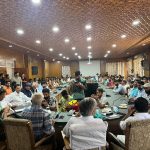Living up to the traditional practice along the mountainous areas of the Kashmir Valley, a unique scene unfolds during this season. Women from remote villages can be seen venturing into the forests, baskets in hand, collecting a variety of wild vegetables. These natural treasures—Pumbhaak (Rheum webbiana), Haend (Taraxacum officinalis), Wopal Haak (Dipsacus Inermis), and Leese (Amaranthus caudatus)—are more than just ingredients for a meal. They represent a tradition deeply rooted in the cultural and practical fabric of the community, one that has been passed down through generations for over fifty years.
The tradition of harvesting wild vegetables in Kashmir is a testament to the resourcefulness and resilience of its people. In the past, economic hardships and the lack of market availability forced villagers to look to the forests to supplement their diet. Elderly residents recall a time when these wild vegetables were not just a seasonal treat but a necessity. Markets were scarce, and the limited sources of income meant that buying vegetables was often out of reach. To ensure they could withstand the long, harsh winters, villagers gathered these vegetables, meticulously cleaning and preserving them.
“The tradition of consuming wild vegetables is not just about food; it’s about health,” says one elder. Indeed, these naturally grown plants are believed to offer significant health benefits. Free from chemical fertilizers and pesticides, they are considered purer and more nutritious than their market counterparts. The practice of using warm water to clean these vegetables further ensures they are safe and ready for consumption during the winter months when fresh produce is hard to come by.
Among the many practices associated with these wild vegetables is the custom of giving Haend to new mothers. For fifteen days postpartum, women are fed this nutrient-rich vegetable to aid in their recovery and strengthen their health. While modern medical advice has led to changes in some of these traditions, many villagers continue to rely on the healing properties of these wild plants. They are used not only as food but also as remedies for various ailments, reflecting a deep-seated belief in their medicinal value.
In today’s context, the practice of harvesting wild vegetables remains relevant, driven by both necessity and preference. The high cost of market vegetables and the widespread use of chemicals in commercial agriculture have made many villagers wary of store-bought produce. Instead, they prefer the natural, chemical-free options that these forests offer. The winter months, characterized by heavy snowfall, further underscore the importance of this tradition. With fresh vegetables scarce during this time, the preserved wild vegetables become a crucial part of the diet.
Despite the passage of time and the advent of modern conveniences, the women of Kashmir’s mountainous regions continue this age-old practice with dedication. Their efforts not only ensure their families are well-prepared for winter but also preserve a vital part of their cultural heritage. The process of gathering, cleaning, and storing these vegetables is a labor of love, reflecting a profound connection to the land and its natural cycles.
This tradition embodies more than just survival; it is a celebration of the rich biodiversity of the region and the sustainable practices that have sustained communities for generations. The women who partake in this annual harvest are the custodians of a legacy that values health, self-sufficiency, and a harmonious relationship with nature.
These women continue to honor the wisdom of their ancestors. They navigate the forests with knowledge passed down through the years, recognizing the plants that hold the promise of sustenance and health. In doing so, they uphold a tradition that has not only nourished bodies but also fostered a resilient and interconnected community.
The harvesting of wild vegetables in Kashmir’s mountains is a vibrant tradition that illustrates the intersection of culture, health, and sustainability. It is a practice that has adapted to the changing times while retaining its core values, ensuring that the people of these remote villages remain connected to their heritage and the natural world. Through their diligent efforts, the women of Kashmir continue to sustain a practice that is as vital today as it was fifty years ago, embodying the spirit of resilience and the enduring bond between people and nature.








